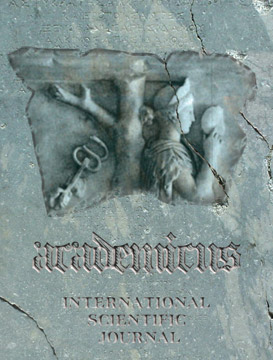Title:
Author(s):
Abstract:
A pragmatist thinker like Nicholas Rescher deems the idea that social harmony must be predicated in consensus to be both dangerous and misleading. An essential problem of our time is the creation of political and social institutions that enable people to live together in peaceful and productive ways, despite the presence of not eliminable disagreements about theoretical and practical issues. Such remarks, in turn, strictly recall the “practical” impossibility of settling philosophical disputes by having recourse to abstract and aprioristic principles. In the circumstances, the social model of team members cooperating for a common purpose is unrealistic. A more adequate model is, instead, that of a classical capitalism where - in a sufficiently well developed system - both competition and rivalry manage somehow to foster the benefit of the entire community (theory of the “hidden hand”). Certainly the scientific community is one of the best examples of this that we have, although even in this case we must be careful not to give too idealized a picture of scientific research. Consensus, however, in the Western tradition is an ideal worth being pursued. At this point we are faced with two basic positions. On the one side (a) “consensualists” maintain that disagreement should be averted no matter what, while, on the other, (b) “pluralists” accept disagreement because they take dissensus to be an inevitable feature of the imperfect world in which we live. A pluralistic vision, therefore, tries to make dissensus tolerable, and not to eliminate it. All theories of idealized consensus present us with serious setbacks. This is the case, for instance, with Charles S. Peirce. As is well known, Peirce takes truth to be “the limit of inquiry,” i.e. either what science will discover in the (idealized) long run, or what it would discover if the human efforts were so extended. By taking this path, thus, truth is nothing but the ultimate consensus reached within the scientific community. We can be sure that, once a “final” answer to a question has been found which is thereafter maintained without change, that one is the truth we were looking for. This fascinating theory, however, has various unfortunate consequences. In our day the German philosopher Jürgen Habermas has in a way revived these Peircean insights, putting forward an influential theory to the effect that consensus indeed plays a key role in human praxis, so that the primary task of philosophy is to foster it by eliminating the disagreement which we constantly have to face in the course of our daily life. In his “communicative theory of consensus,” furthermore, he claims that human communication rests on an implicit commitment to a sort of “ideal speech situation” which is the normative foundation of agreement in linguistic matters. Consequently, the quest for consensus is a constitutive feature of our nature of (rational) human beings: rationality and consensus are tied together. A very strong consequence derives from Habermas’ premises: were we to abandon the search for consensus we would lose rationality, too, and this makes us understand that he views the pursuit of consensus as a regulative principle (rather than as a merely practical objective). Rescher opposes both Peirce’s eschatological view and Habermas’ regulative and idealized one.
Keywords:
Pragmatism; Science; Cultural evolution; Political philosophy; Consensus; Social contract
Full Text PDF:
References:
View complete reference list, click
here
Digital Object Identifier DOI:
The article's content ©Academicus™ Pragmatism and Political Pluralism - Consensus and Pluralism
by
Prof.Dr. Michele Marsonet
is licensed under a Creative Commons
Attribution-NonCommercial 4.0 International License.
Presented:
February 2015
Included for Publishing:
June 2015
Published:
July 2015,
Volume 6,
Issue 12
Academicus International Scientific Journal is an Open Access Journal. This means that all content is freely available without charge to the user or his/her institution. Users are allowed to read, download, print, search, or link to the full texts of the articles in this journal without asking prior permission from the publisher or the author. This is in accordance with the BOAI definition of open access. Users are obliged to cite the source (Academicus International Scientific Journal) and the author, according to the international citation standards.
To learn more about the OA Policy followed by Academicus ISJ, read Journal Regulations
Academicus
International Scientific Journal
pISSN 2079-3715
eISSN 2309-1088
Address:
Sheshi i Flamurit, Rruga Muze
Al-9401 Vlorë, Albania
Tel: +355 68 60 60 555
info@academicus.edu.al
https://academicus.edu.al



 Scholar
Scholar
 Crossref
Crossref
